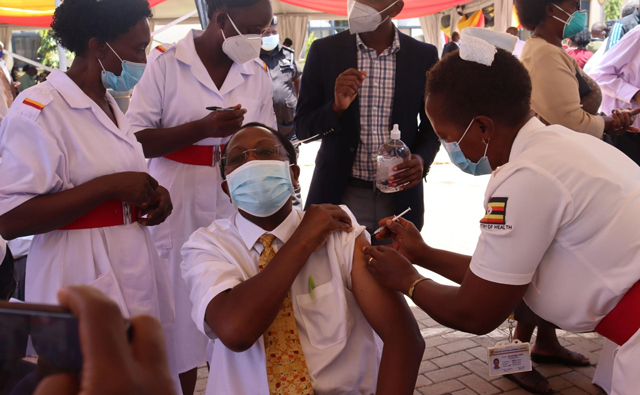
Kampala, Uganda | THE INDEPENDENT | Ministry of Health will not halt the use of the AstraZeneca vaccine, saying no severe effects have been reported.
This follows the suspension of the AstraZeneca vaccine in several countries including the neighboring Democratic Republic of Congo (DRC) on grounds that some of the people who received it developed blood clots while others died.
Dr. Alfred Driwale, the program manager of the Uganda National Expanded Programme on Immunization-UNEPI, says the vaccine is safe and people should not listen to the misinformation circulating on social media.
“The vaccine is safe. We have gone through the data and what we see shows that it is safe. We have not received any complaints of severe reactions to the disease here among people who got the vaccine. The vaccine is safe and can protect against severe disease or death,” Driwale said. One needs two shots of the AstraZeneca COVID-19 vaccine spread at least eight weeks apart to get protection against the virus. According to the Health Ministry, the AstraZeneca vaccine provides immunity against severe forms of the disease or even death by over 70 percent.
Dr. Driwale says the vaccine is the safest option to avoid death at the moment. Dr Diana Atwine, the permanent secretary at the Ministry of Health says that the country will not stop using the vaccine because it is safe.
Last week, the World Health Organisation reiterated the safety of the vaccine at a press meeting, saying there’s no proof that the vaccine was to blame for the reported cases. The Director-General of the UN Health Agency, Dr. Tedros Ghebreyesus said that the clots have not been linked to the vaccine.
“WHO is aware that some countries have suspended the use of AstraZeneca vaccines but it is important to note that the European Medicines Agency has said there’s no link between the vaccine and blood clots. Use of the vaccine can continue while investigations are ongoing,” Dr. Ghebreyesus said.
According to the WHO, only 30 reports of blood clots have been registered after immunization. They believe that the affected persons would still have suffered blood clots whether they were vaccinated or not. Prof Vinand Nantulya, a researcher and developer of a COVID-19 antigen test says that there’s no proof that the vaccine has side effects.
“People need to disregard claims that the vaccine leads to blood clots. The blood clots and the vaccine are not related…Neighboring countries have stopped the use of the vaccine but this does not mean that the vaccine is not safe,” he said.
Similarly, Dr. Monica Musenero, a senior presidential advisor on epidemics, says that the vaccine cannot cause any serious disease, “The vaccine was created using a virus that cannot cause disease. This virus is washed out of the body after some time. It has no living organism and therefore cannot cause disease. All it does is force the body to build resistance against the disease so that when the real COVID-19 virus comes, the body can fight it off.”
Some of the known side effects of the vaccine include; soreness at the injection site, fever, headache, body weakness, and nausea in some cases. To avoid severe reactions, persons with allergies are not advised to get the vaccine. To date, over 1215 people, the majority of whom are health workers have been vaccinated against COVID-19 using the AstraZeneca vaccine.
Uganda is expecting the delivery of over 2 million AstraZeneca vaccines in May. At the moment, even if the country wanted to halt the use of the vaccines, there would be no other available option. While Uganda has received donations of 300,000 COVID-19 vaccines from China, the said vaccines have not yet been approved for use by the WHO.
The other vaccine- the Johnson & Johnson that is being considered by the country is slightly more expensive than the AstraZeneca vaccine. The vaccine costs Shs 73,000 compared to Shillings 62,000 for AstraZeneca.
********
URN
 The Independent Uganda: You get the Truth we Pay the Price
The Independent Uganda: You get the Truth we Pay the Price



